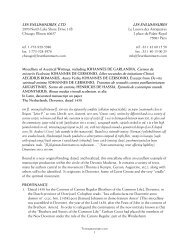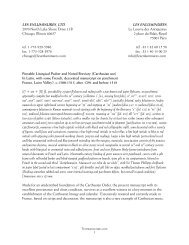PYTHAGORAS, Carmina Aurea (Golden Verses ... - Textmanuscripts
PYTHAGORAS, Carmina Aurea (Golden Verses ... - Textmanuscripts
PYTHAGORAS, Carmina Aurea (Golden Verses ... - Textmanuscripts
You also want an ePaper? Increase the reach of your titles
YUMPU automatically turns print PDFs into web optimized ePapers that Google loves.
<strong>PYTHAGORAS</strong>, <strong>Carmina</strong> <strong>Aurea</strong> (<strong>Golden</strong> <strong>Verses</strong>), with commentary by HIEROCLES<br />
In Greek, manuscript on paper<br />
Italy, probably Supersano (Apulia), c. 1465<br />
iii + 42 folios on paper folded in 4°, watermarks similar to Piccard nos. 122329-122333 (scissors), flyleaves i-ii have a watermark similar<br />
to Piccard nos. 32231- 32233 (cardinal’s hat); collation a 2 (flyleaves), b 1 (flyleaf), i 10 , ii 12 , iii 8 , iv 8 , v 4 ; quires signed by the scribe with<br />
catchwords in the middle of the lower margin of each quire’s last page; 38 lines per page (justification 141 x 86 mm.); ruling (leadpoint)<br />
type Leroy V 00A1. Binding, probably c. 1830 AD: tooled calf over thick cardboard; flyleaves i-ii come from an earlier binding; the<br />
paper pastedowns are c. 1980. Dimensions 220 x 147 mm.<br />
Rare manuscript copy of the <strong>Golden</strong> <strong>Verses</strong>, traditionally attributed to Pythagoras, in the fifth-century<br />
commentary by the Neoplatonist Hierocles. With an illustrious nineteenth-century provenance (Earl<br />
Frederick North, Sir Thomas Phillipps, etc.), the manuscript has been newly identified here as written by the<br />
scribe George, a priest working in Supersano in southern Italy and fits well in the context of the Humanist<br />
interest in Greek texts. Copies are extremely rare; only three are in the Schoenberg Database and none has<br />
appeared on the market since 1979.<br />
PROVENANCE<br />
1. The volume is written by a single hand. The scribe did not sign his name, but can be identified<br />
through palaeographic comparison with the priest George (Γεώργιος ἀνάξιος ῥήτωρ κοιόλης),<br />
who copied and signed MS Vatic. Barber. gr. 226 in AD 1472: J. Mogenet et al., Bibliothecae Apostolicae<br />
Vaticanae codices Barberiniani graeci, 2 vols. to date, Vatican City, 1958-, II:70-71; E. Gamillscheg et al.,<br />
Repertorium der griechischen Kopisten, 800-1600, 3 vols. to date, Vienna, 1981-, III:no.141. This scribe was<br />
active in Supersano in southern Italy.<br />
2. Frederick North (1766-1827), 5th Earl of Guilford (1817-1827). His bookplate (bearing the family<br />
coat of arms and the mottoes “La vertue est la seule noblesse” and “Auspicium melioris aevi”) is glued to the<br />
front pastedown. North’s library was auctioned in seven sales between 1828 and 1835 (a slip from a<br />
sale catalogue is attached to flyleaf i).<br />
3. Sir Thomas Phillipps (1792-1872), Middle Hill, his no. 23007: Catalogus librorum manuscriptorum in<br />
bibliothecae D. Thomae Phillipps, Bart. A.D. 1837 impressus typis MedioMontanis, repr. London, 1968, 425. In<br />
North’s library, the present flyleaves i-ii and ff. 1-42 were bound together with two other texts,<br />
because flyleaf i has the following table of contents written in an eighteenth-century hand: 1° Hieroclis<br />
Philosoph. Pittagorei Opus, 2° Galeni Historia Philosoph., 3° Mercurii Trismegisti Opus Medico-mathematicus.<br />
Phillipps had the three items rebound separately but still grouped under the single shelfmark 23007.<br />
The Galen volume is now in Provo UT, Brigham Young University, Lee Library, L. Tom Perry Special<br />
www.textmanuscripts.com
Collections, Vault 091 G13 1475: A. Touwaide, “Byzantine Medical Manuscripts: Towards a New<br />
Catalogue,” Byzantion 79 (2009), 453-595, esp. 535: no. 23. (see<br />
http://archive.org/details/galenouperiphilo00gale for a fully digitized version of the Galen<br />
manuscript). The Hermes Trismegistes volume was Kraus no. 81 in cat. 153: H. P. Kraus, Bibliotheca<br />
Phillippica: The Final Selection, New York, 1979, p. 94. The scribe of the Galen volume is similar but not<br />
identical to the scribe George of the present volume. The present location of the Hermes<br />
Trismegistes volume is unknown.<br />
4. Phillipps estate, Cheltenham, sold in 1978.<br />
5. Hans Peter Kraus (1907-1988), New York, his no. 63 in cat. 153, sold in 1984 (pencil note on the<br />
back pastedown): H. P. Kraus, Bibliotheca Phillippica, Manuscripts on Vellum and Paper from the 9th to the 18th<br />
Centuries from the Celebrated Collection Formed by Sir Thomas Phillipps: The Final Selection, New York, 1979, 76.<br />
6. Joost Ritman (b. 1941--), Dutch businessman and book collector, founder of The Ritman Library,<br />
Stichting Bibliotheca Philosophica Hermetica, Amsterdam (their bookplate is glued to the front<br />
pastedown), their shelfmark 107 (pencil note on the back pastedown), deaccessioned in 2011.<br />
TEXT<br />
ff. 1r-2v: Pythagoras, <strong>Golden</strong> <strong>Verses</strong>, no title, inc. [ Ἀ] θανάτους μὲν π ρῶτα θεούς, νόμῳ ὡς διάκεινται,<br />
τίμα , des.<br />
ἔσσεαι ἀθάνατος θ( εὸ) ς ἄμβροτος, οὐκέτι θνητός, edd. D. Young and E. Diehl, Theognis,<br />
Leipzig, 1971, 86-94, tr. K. S. Guthrie, The Pythagorean Sourcebook and Library, Grand Rapids, 1987, 163-165.<br />
ff. 2v-39r: Hierocles, Commentary on the <strong>Golden</strong> <strong>Verses</strong>, Ἱεροκλέους φιλοσόφου εἰς τ( ὰ) π υθαγορικ( ὰ) ἔπ η<br />
ὑπόμνημ(α), inc. Ἡ φιλοσοφία ἐστὶ ζωῆς ἀνθρωπίνης κάθαρσις καὶ τελειότης, des. πρὸς τὸ<br />
συναίσθησιν τῆς ἀπ’ αὐτῶν ὠφελείας ὀψὲ γοῦν ποτε κτήσασθαι, ed. F. G. Köhler, Hieroclis in aureum<br />
Pythagoreorum carmen commentarius, Stuttgart, 1974, 5-122, tr. H. S. Schibli, Hierocles of Alexandria, Oxford, 2002,<br />
170-325.,<br />
f. 39r: versified colophon Τέλος ἥδε φέρει γε βιβλίου, φίλοι / Ἱεροκλέ(ους) πυθαγορεΐων ἔπ(ων) /<br />
ἐξηγητοῦ δῆτα παγκαλλίστου πέλει. Τῷ συντελεστῇ τ(ῶν) ὅλων Θ(ε)ῷ χάρις (Friends, here finishes<br />
the book of Hierocles, / excellent interpreter of Pythagorean sayings. Glory be to God through Whom all<br />
labours are completed).<br />
f. 39v: Excerpt (about nobility) from St Gregory Nazianzenus, Homily XXXIII, Τοῦ μ( ε) γ( ά) λ( ου)<br />
Γρηγορίου τ(οῦ) Θεολό(γου) περὶ εὐγενεί(ας), inc. Πᾶσι (μὲν), ὦ οὗτος, ἡ ἄνω Ἱε(ρουσα)λήμ, εἰς ἣν<br />
ἀποτιθέμ(ε)θ(α) τὸ πολίτευμ(α), des. δυσγενὲς (δέ), τὸ τ(ῶν) πενήτ(ων) π(ατέ)ρων, ἢ δ(ιὰ)<br />
συμφορὰν, ἢ δι’ ἐπιείκειαν, ed. J.-P. Migne, Patrologiae cursus completus: Series Graeca, 161 vols., Paris, 1857-<br />
1866, XXXVI:229, tr. Ch. G. Browne and J. E. Swallow in Ph. Schaff, ed. A Select Library of the Nicene and Post-<br />
Nicene Fathers of the Christian Church: Second Series, 14 vols., Oxford and New York, 1890-1900, VII:332.<br />
f. 39r-v: Excerpt (about the soul) from St John Chrysostom, Commentary on I Corinthians, Τοῦ<br />
Χρυσοστ(ό)μ(ου) ἐκ τ(οῦ) Πρὸς Κορινθ(ίους) δευτέ(ραν) [sic], π(ερ)ὶ ψυχῆς, inc. Οὐκ (ἔστι) ψυχῆς<br />
οὐδὲν ἀντάξι(ον), οὐ(δὲ) ὁ κόσμος ἅπας, des. δι’ οὗ καὶ μεθ’ οὗ τῷ Πατρὶ δόξα σὺν ἁγίῳ Πν(εύματ)ι<br />
εἰς τ(οὺς) αἰῶν(ας) τ(ῶν) αἰών(ων), ed. J.-P. Migne, Patrologiae cursus completus: Series Graeca, 161 vols., Paris,<br />
2<br />
www.textmanuscripts.com
1857-1866, LXI:29-30, tr. T. W. Chambers in Ph. Schaff, ed. A Select Library of the Nicene and Post-Nicene Fathers:<br />
First Series, 14 vols., New York, 1886-1890, XII:15.<br />
ff. 40r-41v are blank.<br />
f. 42r, originally blank: church hymn (copied by a later hand) for the Sunday of All Saints Π( ατέ) ρα κατ’<br />
οὐσίαν τὴν θεϊκὴν, ὡς (δὲ) φύσει γενόμε(ν)ος ἄν(θρωπ)ος, ἔφης Θ(εὸ)ν, Ὕψιστε, τοῖς δούλ(οις)<br />
συγκατιών, ἐξαναστ(ὰς) τοῦ μνήμ(α)τ(ος), χάριτι Π(ατέ)ρα τ(ῶν) γηγενῶν, τιθεὶς τὸν κατὰ φύσιν,<br />
Θ(εόν) τε καὶ Δεσπότην, μεθ’ οὗ σε πάντ(ες) μ(ε)γ(α)λ(ύνομεν), tr. Holy Transfiguration Monastery,<br />
The Pentecostarion, Boston, 1990, 474.<br />
f. 42v is blank.<br />
The <strong>Golden</strong> <strong>Verses</strong> traditionally attributed to the Greek mathematician and mystic Pythagoras (c. 570-495 B.C.,<br />
best known for the Pythagorean Theorum, consist of moral maxims comprising 71 lines written in dactyl<br />
hexameter. The <strong>Golden</strong> <strong>Verses</strong> may be divided into two parts, the first treating of the Practical or Human<br />
Virtues, whose aim is the making of Good Men; and the second, treating of the Contemplative or Divine<br />
Virtues, the end of which is to make Good Men into Gods<br />
The exact origins of the <strong>Golden</strong> <strong>Verses</strong> are unclear, and there are varying opinions regarding their dating. No<br />
actual texts by Pythagoras are known to have survived. It appears that the verses may have been known as<br />
early as the third century BC, but their existence as we know them cannot be confirmed prior to the fifth<br />
century AD. In the fifth century AD they were interpreted by the Alexandrian Neoplatonic philosopher<br />
Hierocles (active c. 430), a pupil of Plutarch who lived and worked first in Athens, then in Constantinople.<br />
His commentary on the <strong>Golden</strong> <strong>Verses</strong> is the only work known by him. The commentary of Hierocles<br />
enjoyed great popularity in early modern times: 230 copies are known, mostly from the fifteenth and<br />
subsequent centuries.<br />
The Neoplatonists used the <strong>Golden</strong> <strong>Verses</strong> as part of their preparatory program of moral instruction, which in<br />
part accounts for the popularity of the text among Italian Humanists. A number of Neoplatonic<br />
commentaries on the verses are extant, but that by Hierocles was the most popular. The present manuscript<br />
was produced in southern Italy, where Greeks dialects were spoken until relatively recently and local clerics<br />
would occasionally also copy non-religious texts.<br />
In spite of the number of recorded manuscrips, copies of the text are evidently extremely rare on the market.<br />
The Schoenberg Database lists only four pre-1500 versions of the <strong>Golden</strong> <strong>Verses</strong> (only three with this<br />
commentary). One of these is now in Yale University (Beinecke Library, MS 247, description online). The<br />
last copy sold is the present one, offered by Kraus in 1979.<br />
LITERATURE<br />
Chambers, T. W., tr. in Ph. Schaff, ed. A Select Library of the Nicene and Post-Nicene Fathers: First Series, 14 vols.<br />
Gamillscheg, E. et al. Repertorium der griechischen Kopisten, 800-1600, 3 vols. to date, Vienna, 1981-.<br />
Guthrie, K.S., tr. The Pythagorean Sourcebook and Library, Grand Rapids, 1987, pp. 163-165.<br />
3<br />
www.textmanuscripts.com
Joost-Gaugier, Christiane L. (2007). Measuring Heaven: Pythagoras and his Influence on Thought and Art in Antiquity and<br />
the Middle Ages, Ithaca, NY, Cornell University Press, 2007.<br />
Kahn, Charles H. Pythagoras and the Pythagoreans: A Brief History, Hackett Publishing, 2001.<br />
Köhler, F. G., ed. Hieroclis in aureum Pythagoreorum carmen commentarius, Stuttgart, 1974, pp. 5-122.<br />
Leroy, J. Répertoire de réglures dans les manuscrits grecs sur parchemin, ed. J.-H. Sautel, Turnhout, 1995.<br />
Migne, J.-P. ed. Patrologiae cursus completus: Series Graeca, 161 vols., Paris, 1857-1866.<br />
New York, Holy Transfiguration Monastery, The Pentecostarion, Boston, 1990, 474.<br />
O’Meara, Dominic J. Platonopolis: Platonic Political Philosophy in Late Antiquity, Oxford, Oxford University Press,<br />
2001.<br />
Schibli, Hermann S., tr. Hierocles of Alexandria, Oxford, Oxford University Press, 2002, pp. 170-325<br />
Young, D. and E. Diehl, eds. Theognis, Leipzig, 1971, pp. 86-94.<br />
ONLINE RESOURCES<br />
Picard Online (watermarks)<br />
www.piccard-online.de<br />
Pinakes: textes et manuscrits grecs<br />
http://pinakes.irht.cnrs.fr/<br />
<strong>Golden</strong> <strong>Verses</strong> of Pythagoras with Commentary (in English)<br />
http://www.sacred-texts.com/cla/gvp/index.htm<br />
TM 540<br />
4<br />
www.textmanuscripts.com





